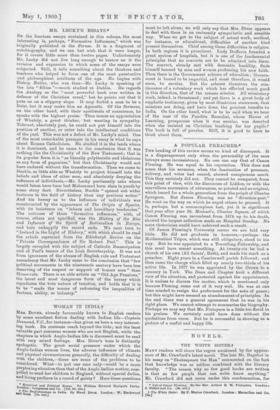WOMAN IN INDIA..t mita Dann, already favourably known to English
readers by some excellent fiction dealing with Indian life—Captain Desmond, V.C., for instance—bas given us here a very interest- ing book. Its contents reach beyond the title ; not the least valuable part concerns women who are not English, while the chapters in which Anglo-Indian life is discussed must be read with very mixed feelings. Mrs. Diver's tone is distinctly apologetic. The great social pressure under which the A.nglo-Indian woman lives, the adverse influence of climate and physical circumstances generally, the difficulty of dealing With the obildren,—these are some of the problems to be considered. What—to put one case only—could be a more Perplexing situation than that of the Anglo-Indian mother, com- pelled to send her children to England, without special duties, and living perforce in a round of gaiety P Here these questions • Historical and Political Essays. By William Edward Hartpolo Looky. London : LOUginang and CO. [Ida Oa. net.]
t The Englishwoman in India. By Maud Diver. London: W. Blackwood and Bona [Ca. not.]
must be left alone; we will only say that Mrs. Diver appears to deal with them in an eminently sympathetic and sensible way. When we get to the subject of actual work, medical, for instance, or educational, difficulties of another kind present themselves. Chief among these difficulties is religion. In both regions it is prominent. Lady Di-actin founded a great system of hospitals, but it is one of the fundamental principles that no converts are to be admitted into thorn. The convert, already met with domestic hostility, finds himself banned by men and women professing his new faith. Then there is the Government scheme of education; Govern- tnent is bound to be impartial, and must therefore, it would seem, be secular. But the scheme threatens the con- tinuance of a voluntary work which has effected much good in this direction, that of the zenana mission. All missionary work, indeed, is threatened ; and yet there is a great body of emphatic testimony, given by most illustrious statesmen, that missions are doing, and have clone, the greatest benefits to India. On the other hand, what is to be said when we hear of the case of the Pandita, Ramabai, whose House of Learning, prosperous when it was secular, was deserted when she insisted on Christian teaching for her pupils ? The book is full of puzzles. Still, it is good to have to think about them.










































 Previous page
Previous page